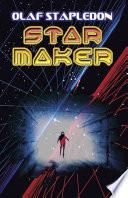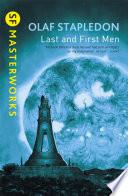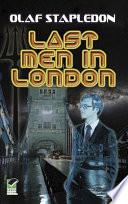Works
Famous Olaf Stapledon Quotes
Source: Star Maker (1937), Chapter V: Worlds Innumerable; 2. Strange Mankinds (p. 61)
Source: Star Maker (1937), Chapter XIII: The Beginning and the End; 3. The Supreme Moment and After (p. 163)
Source: Sirius (1944), Chapter XII Farmer Sirius (an answer to Plaxy's rant about democracy).
Olaf Stapledon Quotes about the world
Source: Last Men in London (1932), Chapter V: Origins of the European war
Source: Philosophy and Living (1939), Chapter VII: Ethics
Source: Star Maker (1937), Chapter XVI: Epilogue: Back to Earth (p. 187)
Source: Last and First Men (1930), Chapter I: Balkan Europe; Section 1, “The European War and After” (p. 18)
Source: Star Maker (1937), Chapter VI: Intimations of the Star Maker (p. 71)
Olaf Stapledon Quotes about space
Source: Last and First Men (1930), Chapter XIII: Humanity on Venus; Section 2, “The Flying Men” (p. 199)
Source: Star Maker (1937), Chapter I: The Earth; 2. Earth Among the Stars (p. 13)
Anticipating the Many-worlds interpretation of quantum mechanics by 20 years.
Source: Star Maker (1937), Chapter XV: The Maker and His Works; 2. Mature Creating (p. 180)
Source: Star Maker (1937), Chapter XV: The Maker and His Works; 2. Mature Creating (p. 177)
Source: Star Maker (1937), Chapter VII: More Worlds; 1. A Symbiotic Race (p. 81)
Olaf Stapledon: Trending quotes
Introduction
Philosophy and Living (1939)
Context: My childhood, which lasted some twenty-five years, was moulded chiefly by the Suez Canal, Abbotsholme, and Balliol. Since those days I have attempted several careers, in each case escaping before the otherwise inevitable disaster. First, as a schoolmaster, I swotted up Bible stories on the eve of the scripture lesson. Then, in a Liverpool shipping office, I spoiled bills of lading, and in Port Said I innocently let skippers have more coal than they needed. Next I determined to create an Educated Democracy. Workington miners, Barrow riveters, Crewe railway-men, gave me a better education than I could give them. Since then two experiences have dominated me: philosophy, and the tragic disorder of our whole terrestrial hive. After a belated attack on academic philosophy, I wrote a couple of books on philosophical subjects and several works of fantastic fiction dealing with the career of mankind. One of them, Last and First Men, is in this series.
Philosophy and Living (1939)
Context: Throughout man's career intelligence and charity have been man's distinctive and most valuable assets. One of our early pre-human ancestors is said to have been much like the Spectral Tarsier, a little mammal about the size of a mouse, with long wiry fingers and huge forward-looking eyes adapted for binocular vision. Not by weapons but by correlation of subtle eyes and subtle hands through subtle brain, this creature triumphed. And man himself conquered the world by the same means, by attention, by discrimination, by skilled manipulation, by versatility; in fact by intelligence and imagination in adapting himself to an ever-changing environment.
Sirius (1944)
Olaf Stapledon Quotes
Other texts
Source: The Core, in: An Olaf Stapledon Reader, Syracuse University Press, New York 1997: pp. 266-272.
Source: Star Maker (1937), Chapter X: A Vision of the Galaxy (p. 133)
Source: Star Maker (1937), Chapter XIII: The Beginning and the End; 3. The Supreme Moment and After (p. 162)
Source: Last and First Men (1930), Chapter VII: The Rise of the Second Men; Section 3, “The Zenith of the Second Men” (p. 112)
Part I Crisis, 2. The Modern Age
Darkness and the light (1941/42)
Source: Star Maker (1937), Chapter I: The Earth; 2. Earth Among the Stars (p. 14)
Source: Last and First Men (1930), Chapter II: Europe’s Downfall; Section 1, “Europe and America” (pp. 34-35)
“Chapter IV: Paul comes of age”
fragments of poems supposedly writen by Paul
Last Men in London (1932)
Source: Last and First Men (1930), Chapter XIII: Humanity on Venus; Section 1, “Taking Root Again” (p. 195)
Source: Star Maker (1937), Chapter V: Worlds Innumerable; 3. Nautiloids (p. 69)
Source: Star Maker (1937), Chapter XIII: The Beginning and the End; 3. The Supreme Moment and After (p. 161)
Source: Last and First Men (1930), Chapter XV: The Last Men; Section 3, “A Racial Awakening” (pp. 228-229)
Source: Last and First Men (1930), Chapter III: America and China; Section 1, “The Rivals” (p. 43)
Source: Philosophy and Living (1939), Chapter VIII: Personality
Source: Star Maker (1937), Chapter II: Interstellar Travel (pp. 17-18)
Part V The Reign of Darkness, 3. Diabolic World Empire.
Darkness and the light (1941/42)
Source: Star Maker (1937), Chapter XV: The Maker and His Works; 2. Mature Creating (p. 179)
Other texts
Source: Waking World, Chapter 11: Religion http://olafstapledonarchive.webs.com/wakingworld_ch11.html
Source: Last and First Men (1930), Chapter XIV: Neptune; Section 1, “Bird’s-Eye View” (p. 206)
Source: Star Maker (1937), Chapter III: The Other Earth; 1. On the Other Earth (p. 26)
Source: Last and First Men (1930), Chapter I: Balkan Europe; Section 1, “The European War and After” (p. 17)
Source: Last and First Men (1930), Chapter VII: The Rise of the Second Men; Section 3, “The Zenith of the Second Men” (pp. 112-113)
Source: Star Maker (1937), Chapter XIII: The Beginning and the End; 3. The Supreme Moment and After (p. 161)
Source: Star Maker (1937), Chapter XV: The Maker and His Works; 2. Mature Creating (pp. 176-177)
Source: Star Maker (1937), Chapter III: The Other Earth; 1. On the Other Earth (pp. 25-26)
Source: Last and First Men (1930), Chapter II: Europe’s Downfall; Section 1, “Europe and America” (p. 33)
Source: Star Maker (1937), Chapter XII: A Stunted Cosmical Spirit (p. 151)
Source: Star Maker (1937), Chapter III: The Other Earth; 3. The Prospects of the Race (p. 39)
Source: Last and First Men (1930), Chapter I: Balkan Europe; Section 1, “The European War and After” (p. 17)
Last Men in London (1932)
Source: Last and First Men (1930), Chapter XII: The Last Terrestrials; Section 1, “The Cult of Evanescence” (p. 176)
Source: Star Maker (1937), Chapter XIII: The Beginning and the End; 3. The Supreme Moment and After (p. 164)
Part V The Reign of Darkness, 2. A Synthetic War
Darkness and the light (1941/42)
Part VIII Precarious Advance, 3. Progress.
Darkness and the light (1941/42)
Source: Last Men in London (1932), Chapter I: The World of the Last Men.
Philosophy and Living (1939)
Source: Star Maker (1937), Chapter XIII: The Beginning and the End; 3. The Supreme Moment and After (p. 162)
Source: Sirius (1944), Chapter IV Youth (a conversation between Sirius and Plaxy).
Source: Star Maker (1937), Chapter XVI: Epilogue: Back to Earth (p. 187)
Source: Last and First Men (1930), Chapter XV: The Last Men; Section 4, “Cosmology” (p. 229)
Source: Star Maker (1937), Chapter I: The Earth; 2. Earth Among the Stars (p. 15)
Source: Last and First Men (1930), Chapter III: America and China; Section 2, “The Conflict” (p. 50)
Source: Star Maker (1937), Chapter XIII: The Beginning and the End; 3. The Supreme Moment and After (p. 164)
Source: Star Maker (1937), Chapter XIII: The Beginning and the End; 3. The Supreme Moment and After (p. 164)
Source: Star Maker (1937), Chapter X: A Vision of the Galaxy (p. 129)
Source: Star Maker (1937), Chapter XIII: The Beginning and the End; 3. The Supreme Moment and After (p. 166)
“Discontent goaded the spirit into fresh creation.”
Source: Star Maker (1937), Chapter XIII: The Beginning and the End; 3. The Supreme Moment and After (p. 161)
Source: Last and First Men (1930), Chapter I: Balkan Europe; Section 3, “Europe After the Anglo-French War” (p. 26)
Source: Sirius (1944), Chapter VI Birth-pangs of a Personality


